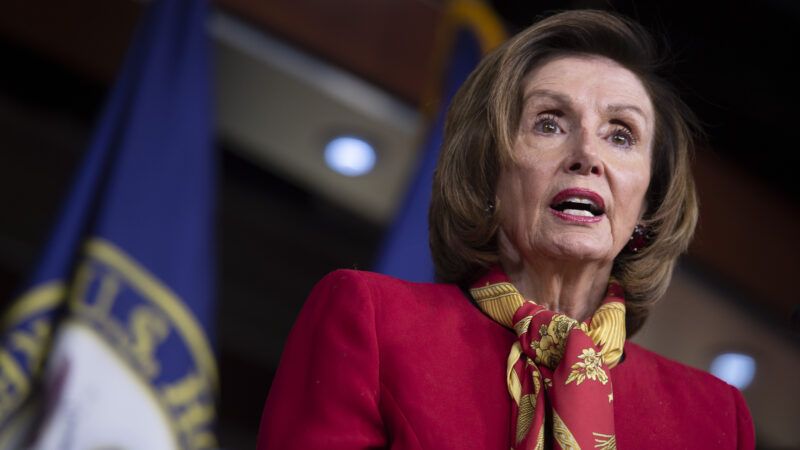Hey, Nancy Pelosi: 'National Debt Should Be a Top Priority'
A bipartisan group of lawmakers are calling for two deficit reduction ideas to be included in this year's federal budget bill.

Ahead of the annual congressional scramble to piece together a federal budget—a process that will begin in earnest after President Joe Biden's state of the union address next week—a bipartisan group of lawmakers are asking a question that's rarely part of the proceedings these days.
How are we actually going to pay for all this?
In a letter sent on Tuesday, 24 members of the House of Representatives called on Speaker of the House Nancy Pelosi (D–Calif.) to take some small but important steps to rein in America's out-of-control national debt. The letter highlights the fact that policies enacted during the past five years—including pandemic relief, but also "Congress' perennially broken budget process and fiscal policies"—have added $13 trillion to the projected levels of debt in 2031, at the end of the 10-year window Congress uses for budgeting.
"It has been over a decade since Congress enacted any legislation that significantly addressed these longstanding structural problems or improved the nation's fiscal outlook," the lawmakers wrote to Pelosi. "Our national debt should be a top priority for both parties and addressed on a bipartisan basis."
Yes, the letter represents the view of just 24 of the House's 435 members. Still, any discussion of the debt and the need to address it is welcome.
America's national debt cracked the $30 trillion mark earlier this month, and projections show that it will continue to grow (both in absolute terms and as a percentage of the size of the economy) for the foreseeable future. The Congressional Budget Office (CBO) now forecasts that the debt will be twice the size of the economy by 2051, while the Government Accountability Office (GAO) predicts that the debt will grow to four times the size of America's economy before the end of the century. Those projections do not account for the effects of future recessions, pandemics, wars, or other costly and unexpected problems.
"U.S. fiscal policy today is not sustainable," argue Veronique de Rugy and Jack Salmon, researchers at the Mercatus Center, a free market think tank, in a new report published Wednesday. "Not only is our debt ratio at the highest level in peacetime history, but also our future budgetary outlook is even bleaker."
Perhaps it was the symbolic $30 trillion debt threshold that has prompted some lawmakers to call on Pelosi to take action. But another factor is the high levels of inflation America is currently experiencing. As Reason has previously explained, inflation and high debt create a trap for policymakers: higher inflation could lead the Federal Reserve raise interest rates, which would increase the payments owed on the debt.
Regardless of the reasons, the 24 lawmakers who signed this week's letter are asking for two policies that are the lowest of low-hanging fruit. First, they are seeking the creation of a bipartisan debt commission, similar to one implemented during President Barack Obama's first term that helped trigger modest reductions in annual budget deficits following the Great Recession.
Commissions are a great way for lawmakers to make it look like they're doing something without actually doing it, of course, but in this case, it might be a helpful exercise. It has been so long since debt and deficit politics have featured prominently in politics that it's not clear whether there is a workable coalition in Congress to address the debt. A commission may help organize and focus those debates—and may raise further awareness among voters.
The second idea is slightly more concrete. The lawmakers are asking Pelosi to include in the budget changes to how the debt ceiling operates. The proposed changes would allow the president to unilaterally lift the debt limit as long as Congress has passed a budget resolution that contains certain debt-reduction measures for the current year. Failing that, the president would still be able to raise the debt ceiling unilaterally, though Congress would have 30 days to override the decision.
It's yet another delegation of congressional authority to the executive, but Rep. Scott Peters (D–Calif.), one of the members to sign this week's letter to Pelosi, says the upshot is an end to political brinkmanship over the debt ceiling—a recurring showdown that often features a government shutdown but that does not accomplish anything in terms of debt and deficit policy.
And, remember, raising the debt ceiling is not the same as adding to the debt. The debt ceiling merely authorizes the Treasury to borrow funds to pay for spending already approved by Congress. Objections to increasing the debt ceiling amount to little more than a refusal to pay overdue credit card bills—a temper tantrum that doesn't address the actual problem of overspending.
A bipartisan debt commission and changes to the debt ceiling won't fix America's fiscal mess, but they are "commonsense ideas" that "would be important steps in the right direction," according to the Committee for a Responsible Federal Budget, a nonpartisan group that advocates for reducing the deficit.
And they are steps that the country will have to take, sooner or later. "We owe it to our children," the lawmakers wrote to Pelosi, "to acknowledge our country's unsustainable fiscal trajectory and work together, across the aisle, to address it over time."


Show Comments (126)